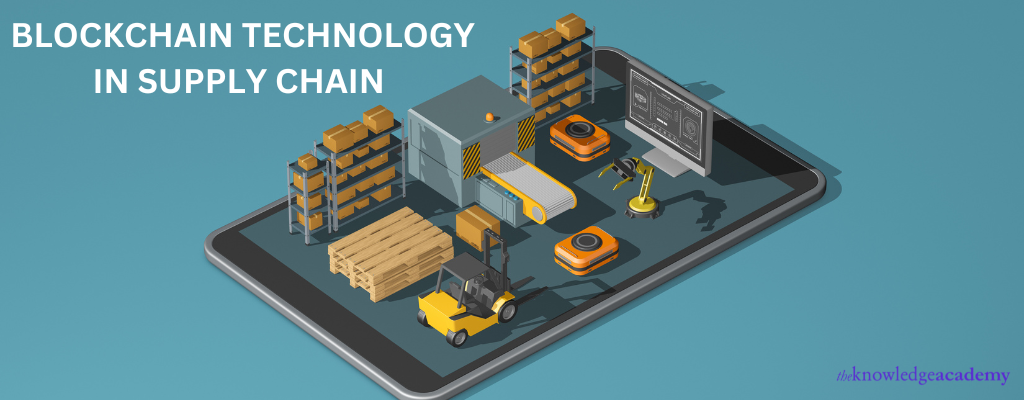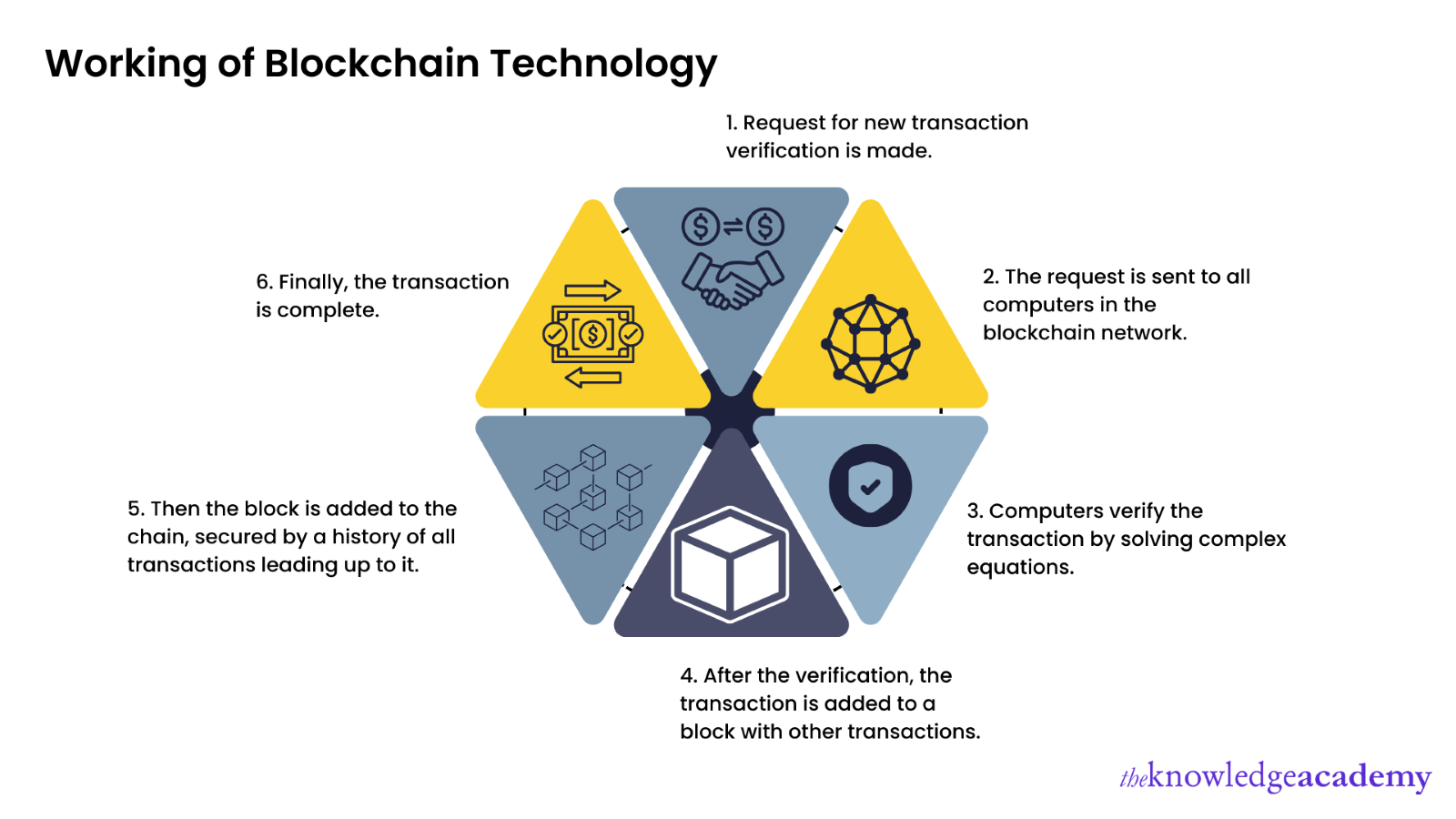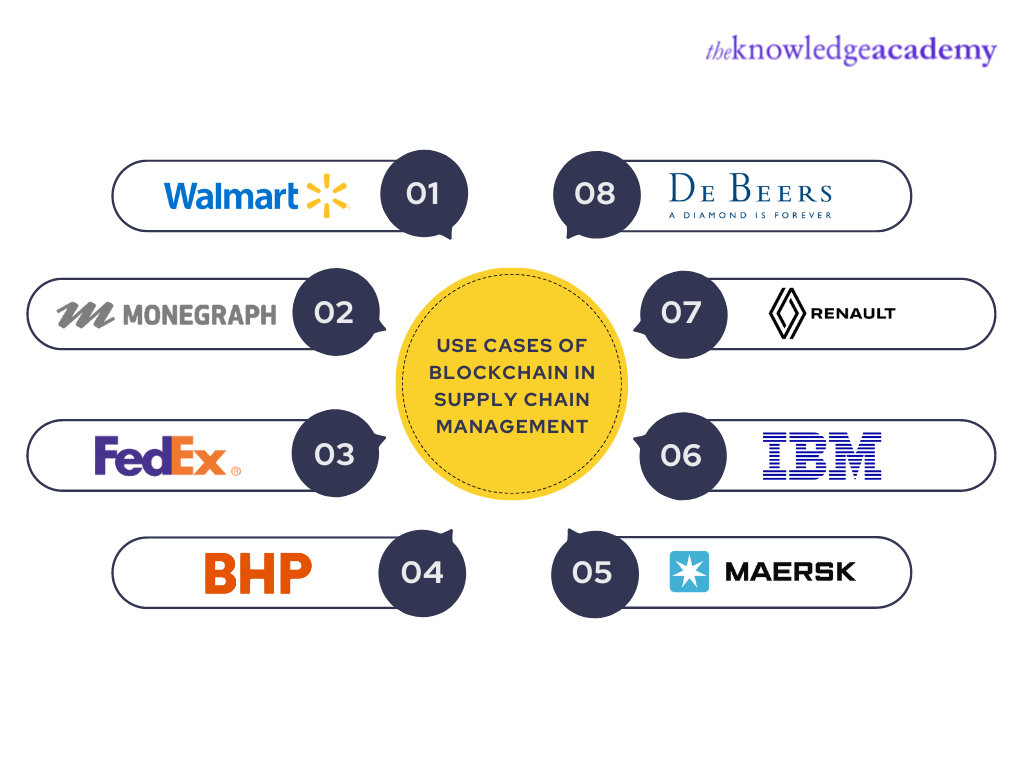We may not have the course you’re looking for. If you enquire or give us a call on 01344203999 and speak to our training experts, we may still be able to help with your training requirements.
Training Outcomes Within Your Budget!
We ensure quality, budget-alignment, and timely delivery by our expert instructors.

When many hear the word ‘Blockchain’, they first think of cryptocurrencies or complex technology. However, it is not cryptocurrencies that have made Blockchain popular but the technology itself. Today, every industry is finding innovative ways to leverage Blockchain's advantages.
According to Statista, the advantages of Blockchain are so much so that the global spending on Blockchain solutions will reach £16 Billion by 2024. One primary industry that is making huge contributions to this is the Supply Chain industry. Using this technology in Supply Chain is solving significant challenges in the industry that kept it lagging over the years.
Blockchain supports the Supply Chain by improving transparency, and traceability, reducing waste and lowering costs. Thus, it is helping businesses grow like never before. Read this blog further to understand how Blockchain solves the challenges facing the Supply Chain industry.
Table of contents:
1) What is Blockchain Technology
2) What is supply chain?
3) How does Blockchain provide value to Supply Chain
4) Supply Chain challenges facing businesses worldwide
5) Companies Using Blockchain in Supply Chain Management
6) How is the modern Supply Chain evolving?
7) The future of Blockchain-based Supply Chain?
8) Conclusion
Join Blockchain Training Course to learn technical concepts of Cryptography and Bitcoin!
What is Blockchain Technology
The word "Blockchain" comes from the "blocks" of verified and immutable transactions and how they connect to form a chain. Therefore, the term "Blockchain" was created. This technology gained immense popularity for its ability to validate, record, and distribute transactions in immutable, encrypted ledgers.
Blockchain Technology is mainly famous for its decentralised ledger, which records and protects transaction details and makes them tamper-resistant. A peer-to-peer network of numerous connected computers, or nodes, receives a broadcast when a transaction is requested on the system. Each of them solves equations across the network to verify and confirm the transaction. Once the transaction has been verified, it is compiled with other transactions to form a block of information for the ledger.

Blockchain Technology was a game-changer in the financial world, as it supports digital-record keeping for cryptocurrency transactions. Bitcoin Blockchain, Ethereum Blockchain, and Dogecoin are some popular cryptocurrencies that use this technology to enable limitless and anonymous participants to conduct transactions without needing a facilitator.
This latest technological innovation has disrupted traditional Supply Chain practices. Businesses are increasingly adopting Blockchain Supply Chain. Let's first understand what Supply Chain is in detail in the next section.
Refer to these Blockchain Interview Questions and Answers to crack your next job interview!
What is Supply Chain?
How many stakeholders purchase the same toothbrush you bought last time from a retailer in your neighbourhood? Every product that reaches your household represents the efforts of many organisations and stakeholders. Collectively, this is referred to as Supply Chain.
Supply Chain Management (SCM) refers to raw material procurement, product development, sourcing, production and logistics of various raw materials and finished goods from one place to another. Effective SCM plays a significant role in reducing costs, and wastes, mitigating risks and speeding up the production cycles, benefitting the overall business success.
Ensuring that the Supply Chain Management is efficient is a must, as businesses and consumers want companies to guarantee product authenticity. In comparison, the stakeholders involved in the Supply Chain demand responsible sourcing, logistics and transparency in transactions to minimise waste and disputes.
How does Blockchain provide value to Supply Chain?
Here, we will discuss the various benefits businesses employing Blockchain Supply Chain gain:
Increased efficiency
As Blockchain relies on a shared peer-to-peer network, it improves communication and collaboration for all stakeholders involved. It increases efficiency through greater traceability, thus eliminating waste, duplicate orders and invoice fraud.
It allows companies to complete transactions without third-party involvement. Contract compliance encourages all the stakeholders to meet their agreed-upon obligations on time. Complete transparency in financial transactions improves business performance and reduces uncertainty and risk.
Blockchain is integrated with Radio-Frequency Identification (RFID) tags that use electromagnetic fields to identify and track items in the Supply Chain.
Efficient record Keeping
Blockchain helps in managing the supply chain more efficiently, as multiple parties can keep track of price, date, location, quality, certification, and other pertinent information. This has the added benefit of needing less manual documentation about the details of product and its supply process.
Data exchange
Blockchain serves as an excellent solution where data needs to be exchanged between multiple parties, ensuring transparency. This also promises better trust between two or more parties, as transparency reduces the potential of fraudulent activities.
Ethical and sustainable sourcing
It is simpler to confirm where materials and things come from, where they go as they move through the supply chain, and who has access to them, thanks to blockchain's traceability and tamper-resistance advantage.
Transparency and visibility
Blockchain-supported Supply Chains are highly transparent as records on Blockchain cannot be erased once entered. Additionally, because every step in the supply chain is securely recorded, logistics problems may be quickly traced to the source problem. The same is valid for obtaining raw materials or components that can be used to track down their place of origin and improve accountability and transparency. Additionally, it strengthens corporate reputation by providing transparency of materials used in products.
Saving costs
There will be less stock loss and waste with Blockchain Technology, thereby leading to huge cost savings. A distributed network of Blockchains that shares resources and transactions digitally eliminates the necessity for paper-based workflows and materials. Going paperless reduces expenses not only in terms of materials but also in terms of storage and labour needed to process and manage all those physical documents.
Integration with other technologies
Blockchain easily incorporates other modern technologies like process automation and Internet of Things (IoT) devices like smart sensors and RFID tags to further increase efficiency, visibility, and accuracy throughout the Supply Chain.
Learn how Bitcoins work and how Bitcoins are made secured by joining Bitcoin and Cryptocurrency Course!
Supply Chain challenges facing businesses worldwide
Here, we will discuss the major Supply Chain challenges facing businesses across the world. One of the greatest challenges businesses faces is the lack of visibility and transparency in the Supply Chain.
Many businesses believe that a lack of transparency in the Supply Chain keeps them from growing. The challenges are identifying and collecting data from all stakeholders in the supply chain promptly. In addition, the other challenge is accurately communicating this information in-details to everyone involved.
Next problem comes with the traceability of transactions and avoiding unauthorised individuals from tampering with the details. Due to a lack of traceability and transparency, organisations experience huge administrative costs. Other Supply Chain challenges are ensuring the traceability of materials, logistic disruption, loss because of counterfeiting and gray market trades, etc.
Companies Using Blockchain in Supply Chain Management

Read further to understand the use cases of Blockchain Technology that represent how it has already changed the Supply Chain worldwide:
Walmart
It tested an application using Blockchain Technology that traces pork in China and produces it in the USA. This helped authenticate transactions and the accuracy of record keeping.
Monegraph
Monegraph was founded in 2014, uses blockchain technology to protect the usage and sharing rights of digital media. It includes video snippets or brand-sponsored material, and it also makes it possible for media creators, publishers, and distributors to share in the profits.
FedEx
FedEx has incorporated Blockchain Technology into its chain of custody in order to enhance traceability, offer a reliable record, and help resolve consumer complaints. The business is a strong proponent of the development of a blockchain-based industry standard and has joined the Blockchain in Transport Alliance (BiTA).
Giant mining company
Giant mining company BHP is adopting blockchain to digitally transform its business processes, using Blockchain technology. This will help them authenticate their suppliers and guarantee that all environmental, social, and governance standards are upheld across the supply chain. With China Baowu Steel, the business finalised its first blockchain iron ore deal in 2017 for about £12 million.
Famous companies like Maersk and IBM are employing this technology for cross-border, cross-party transactions to improve process efficiency.
The famous automobile company Renault is moving its Supply Chain documentation to Blockchain. With its distributed ledger, Blockchain allows sharing and tracking of information when multiple parties are involved. This is also encouraging other companies to adopt this technology.
DeBeers
DeBeers is keeping track of the origin and development of every single natural diamond they mine using Blockchain Technology. It will not only boost productivity and inventory management but also aid the business in addressing client concerns about the ethical sourcing of gemstones.
How is the modern Supply Chain evolving?
Thanks to the usage of modern technologies like Automation and Artificial Intelligence (AI), Supply Chain Management systems have outgrown their past limitations such as rigid physical systems. Supply Chain successfully integrated data from different sources, forming a network in order to increase the range and reach of its services. This allowed the creation of a collective database which has records of supply, demands, sales and profit made on all of its outlets.
As time has passed, Supply chain has also successfully integrated other features like AI algorithms to extract massive amount of data from various sources. These data samples help a Supply Chain into making their services much more efficient. Supply chains were able to analyse the sales, demands and frequency of purchases made on a product with help of algorithms that analyse human behaviour.
In addition to AI, usage of automation and automated machines has reduced cost of manual work, optimising deliveries as well as increased productivity. This was thanks to machine’s greater capacity to perform manual labour with less demands, and shorter resting periods. Robotics technology played a large part in mechanisation of manual labour in the Supply Chain.
Supply Chain also grew technologically to have better counter measures against frauds. This was possible due to Blockchain providing the means to track a delivery and trace the state of product on each instance, leading to greater accountability.
Become an Ethereum developer by signing up for the Ethereum Developer Training course.
The future of Blockchain-based Supply Chain?
Blockchain comes with added benefits that can curb the issues, which have existed in Supply Chain for a relatively long time. One of such benefits is its transparency, due to the decentralised nature of Blockchain and its transparency, it is possible to track an order or product from its state of manufacture to the final destination. This can lead to a higher ethical standard for the Supply Chain, and reducing the opportunities of malpractice within the supply system. This as whole would result in better relations with your customers and greater trust from general public.
Blockchain can also reduce a significant amount of paper work, as majority of information will be available on all instances to every party evolved freely, thus preventing the need to document them manually in a centralised data base or storage. This is still considered a distant dream due to the fact that Blockchain is considered a developing technology. It’s initial stages makes it hard to predict the integration methods necessary, to make the Supply Chain better, but it is likely that as time progresses Blockchain methods will become more prominent within Supply Chain.
Conclusion
The Era of Blockchain Technology has just started and is here to stay for a good time now. Blockchain provides several solutions for the many challenges the Supply Chain sector faces today. If you’re looking to shift your career or start your career in Blockchain Technology, it is undoubtedly the best decision. So, continue learning as the technology advances and various industries find innovative ways to take advantage of Blockchain Technology.
To understand the basics of Cryptocurrency and Bitcoin, Join Blockchain Training now.
Frequently Asked Questions
Upcoming Advanced Technology Resources Batches & Dates
Date
 Blockchain Training Course
Blockchain Training Course
Thu 11th Jul 2024
Thu 19th Dec 2024







 Top Rated Course
Top Rated Course




 If you wish to make any changes to your course, please
If you wish to make any changes to your course, please


